In the treasure trove of natural herbs, coriander seeds are an indispensable ingredient in both culinary arts and Traditional Chinese Medicine (TCM) since ancient times.
Important Notes on Using Coriander Seeds
Not only known for their distinctive aroma that enhances the appeal of dishes, coriander seeds also possess numerous health benefits. From boosting the digestive system, relieving pain, supporting heart health to improving respiratory function…
1. Nutritional Value of Coriander Seeds
Coriander seeds are dark brown, lightweight, and small, measuring only about 3-4 mm. According to a 2015 study published in Science Direct, coriander seeds contain key compounds such as petroselinic acid (a type of fatty acid) and linalool. This seed variety is also rich in quercetin, gallic acid, caffeic acid, tannins, sterols, and tocopherols.
According to USDA, 100g of coriander seeds contains 8.86g of water and 298 kcal of energy, along with other nutrients such as:
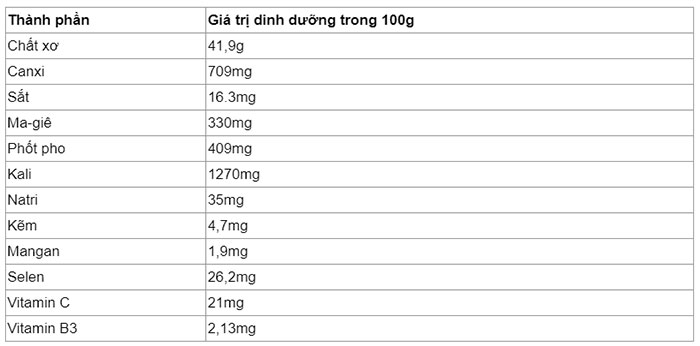
Coriander seeds are a rich source of lipids, making up 28.4% of the total seed weight, which can be significantly important in the food industry.
2. Health Benefits of Coriander Seeds
Below are the health benefits of coriander seeds. The benefits experienced may vary from person to person.
2.1. Coriander Seeds are Good for Skin, Promote Rapid Recovery from Rashes
In addition to their characteristic aroma when used in bath water, coriander seeds are also high in linolenic acid (an essential fatty acid necessary for health that cannot be synthesized in the human body). Linolenic acid has strong anti-inflammatory properties effective in preventing skin aging caused by the negative effects of UV rays and the associated redness.
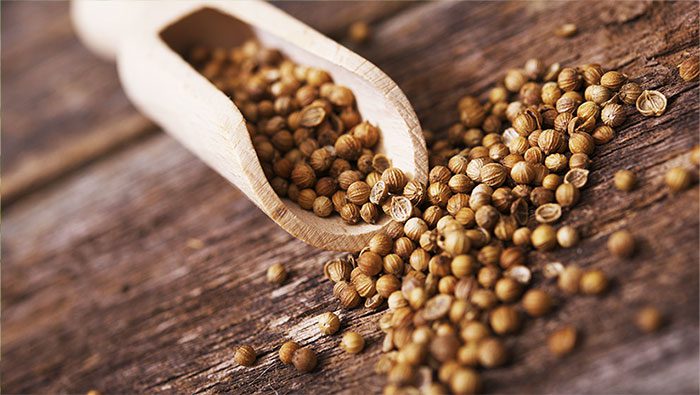
Coriander seeds are light brown. (Photo: Internet).
According to a 2014 study published in NCBI, due to these properties, coriander seeds and leaves can be used to help treat skin conditions such as eczema, pimples, or blisters.
2.2. Reduces Blood Sugar Levels
Coriander seeds and their essential oil have been shown to significantly reduce blood sugar levels in people with diabetes. According to WebMD, current trials indicate that components in coriander seeds help activate enzymes that assist the body in managing blood sugar levels effectively, such as insulin. Another study also showed that this spice improves carbohydrate metabolism and enhances the hypoglycemic effect in mice.
However, more research is needed.
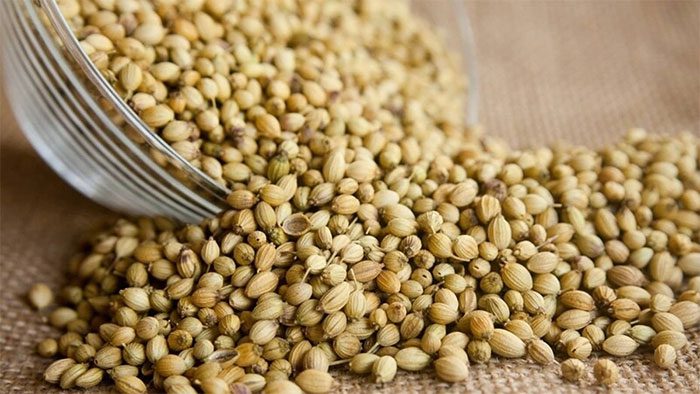
Coriander seeds naturally reduce blood sugar. (Photo: Internet).
2.3. Lowers Cholesterol
Coriander seeds have properties that help lower cholesterol levels thanks to their rich nutritional components such as copper, zinc, iron, and other essential minerals that enhance red blood cell production and improve heart health. According to one study, coriander seeds can help lower “bad” cholesterol and increase “good” cholesterol levels in the body. High cholesterol increases the risk of chronic diseases such as obesity, diabetes, hypertension, and other cardiovascular diseases.
Additionally, coriander seeds also enhance the body’s metabolic processes, according to Times of India.
2.4. Improves Hair Health
Coriander seeds are rich in vitamins K, B, and C, along with antioxidants such as flavonoids that benefit hair health by promoting hair growth and slowing down premature graying due to oxidative stress, resulting in stronger and longer hair.
2.5. Treats Colds and Influenza
According to Boldsky, coriander seed tea or infusion can be an excellent beverage to combat cold and flu symptoms due to its antioxidant, anti-inflammatory, pain-relieving, and antibacterial properties. Thus, coriander seeds can help reduce inflammation in the respiratory tract, boost the immune system, and assist in the treatment of colds and flu.
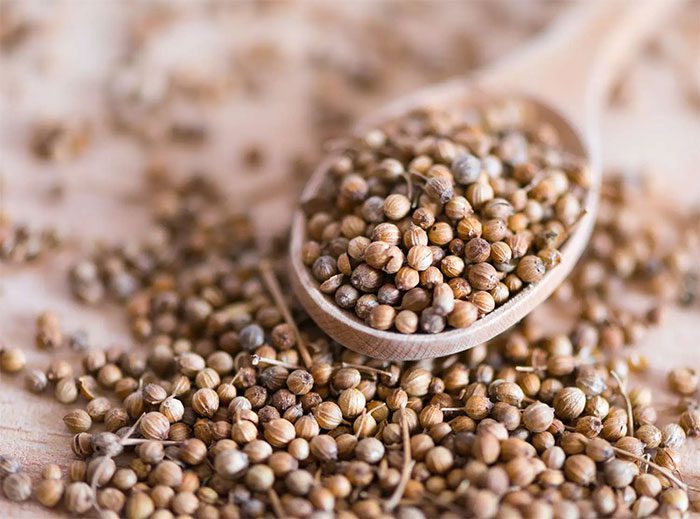
Coriander seed infusion can be an excellent beverage. (Photo: Internet).
2.6. Aids Digestive Issues
Coriander seeds promote digestion and have natural antibacterial properties. They help reduce nausea, vomiting, stomach pain, and bloating by supporting the breakdown of food and reducing the presence of harmful bacteria in the gut.
A study published in Journal of Gastroenterology and Digestive Diseases conducted on a group of people with IBS assessed the impact of a coriander-containing formulation compared to a placebo. After 8 weeks, those using the coriander formulation showed a significant reduction in the severity and frequency of abdominal pain and discomfort, experiencing less severity and frequency of bloating than the placebo group.
Moreover, coriander seeds also contribute to antioxidant activities, helping the body eliminate free radicals and reduce inflammation.
In addition to the aforementioned health benefits, coriander seeds are also applied to support conditions like hemorrhoids, conjunctivitis, hormonal imbalances due to irregular menstruation, and alleviate premenstrual symptoms or swelling (due to obesity, salty diets, pregnancy, medication) acting as a diuretic, according to Boldsky.
Additionally, coriander essential oil, commercially known as Coriander oil, is a light yellow liquid with a fragrant aroma. The main component of coriander oil is linalool, comprising 63.1 – 75.5%. Coriander essential oil is used as a flavoring agent in the food industry, pharmaceutical products, and fragrance manufacturing.
3. Risks and Side Effects
If you have a history of allergies to star anise, fennel, mugwort, or similar plants, you may also be allergic to coriander and coriander seeds.
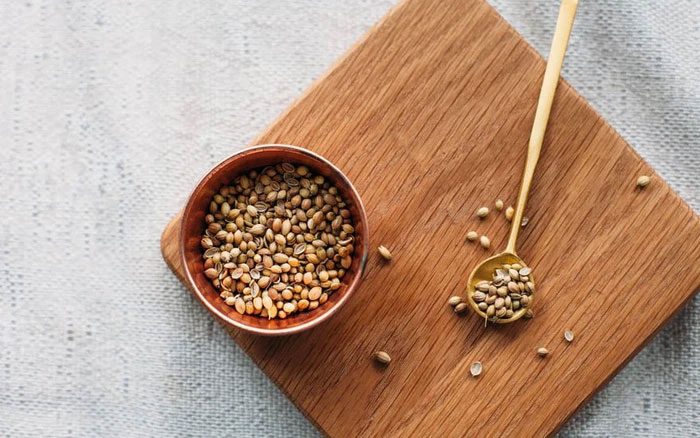
Avoid excessive use of coriander seeds to prevent unwanted side effects. (Photo: Internet).
Due to their ability to naturally lower blood sugar levels, you need to closely monitor your blood sugar levels if you have diabetes and are using this spice.
Furthermore, coriander seeds can lower blood pressure, so if you have low blood pressure or are taking medication to lower blood pressure, you should be cautious when consuming them.
You may drink coriander seed water daily; however, to avoid excessive consumption, it is recommended to only take a quarter to half a teaspoon of coriander powder.
In general, coriander seeds have many health benefits. If you have chronic health issues, it is advisable to consult a doctor before use to avoid unwanted side effects.


















































